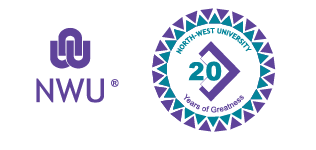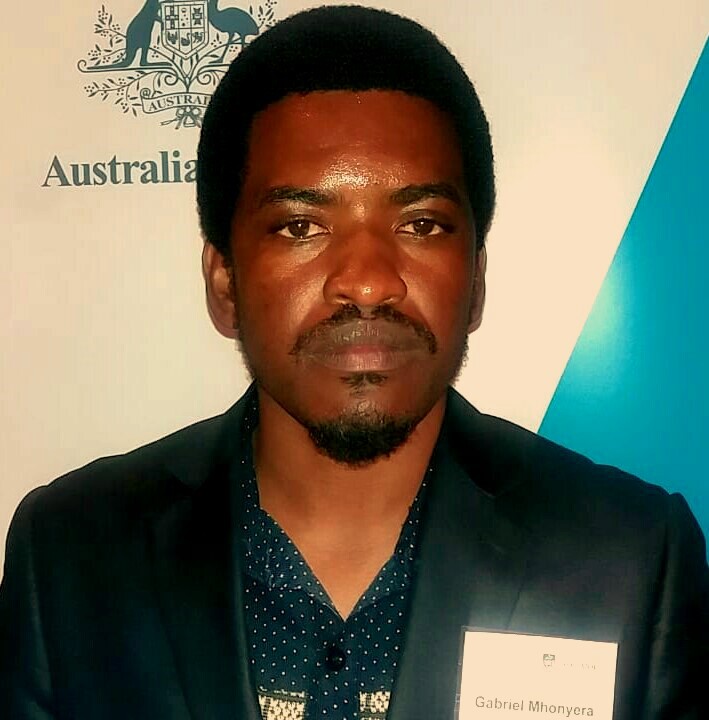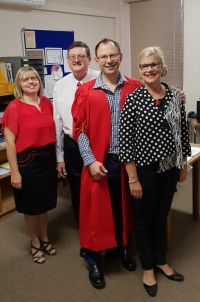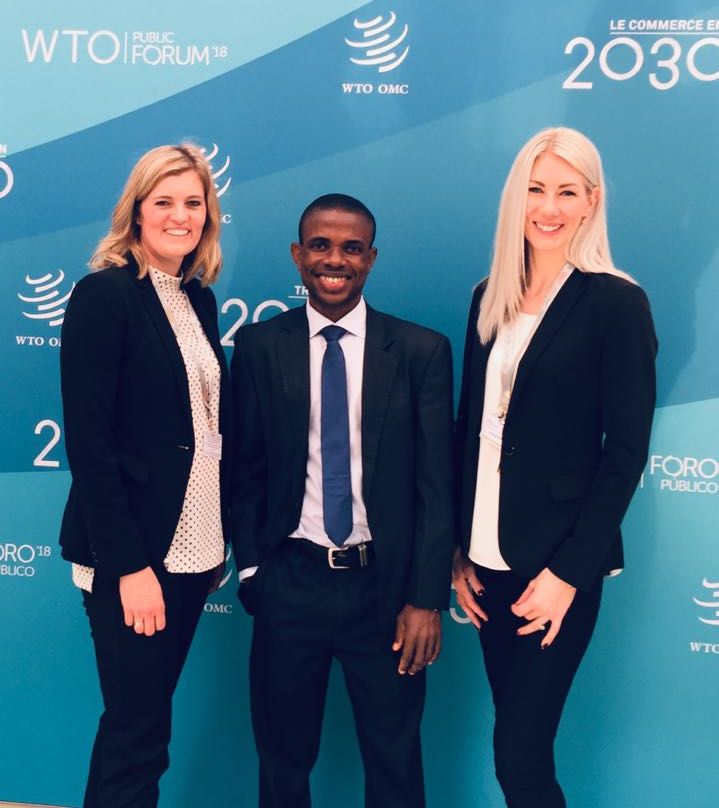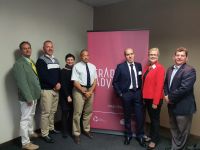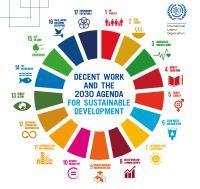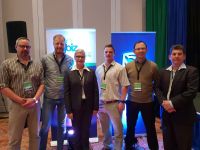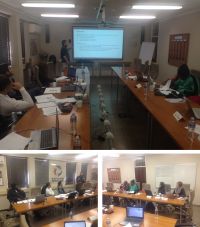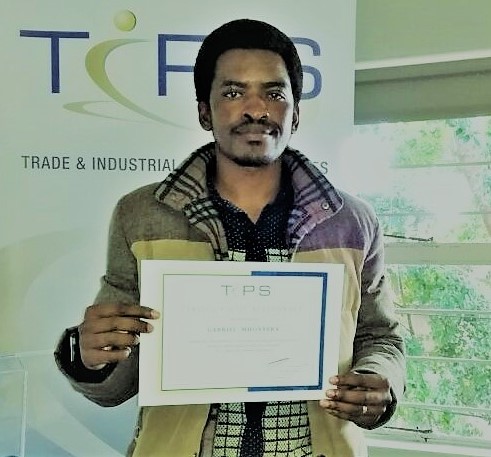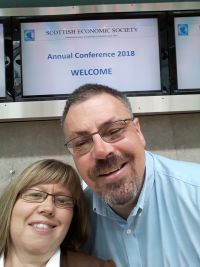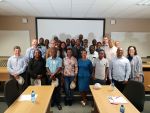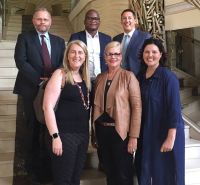
| UPCOMING EVENTS | |||
 |
2018 events
3-5 December 2018: PhD student attends African Economic Conference
NWU PhD student Emmanuel Orkoh attended the African Economic Conference in Kigali, Rwanda from 3-5 December 2018. On the second day of the conference he presented a paper titled 'Gender Welfare Effects Of Regional Trade Integration On Households In Ghana'.
Photo: Mr Emmanuel Orkoh.
23 November 2018: African diplomacy in uncertain times
On 23 November, Prof Wilma Viviers and Mr Gabriel Mhonyera, attended a conference in Rosebank which explored the current dynamis facing the global world trade system. In particular, discussions focused upon how African countries are responding to the new international trade environment. The role and place of the World Trade Organization (WTO) as well as the African Continental Free Trade Agreement (AfCFTA) also featured prominently in discussions. Individuals from within the WTO secretariat emphasised the need for the WTO to transform its trading rules in the face of rising threats from protectionism and bilateralism.
Photo: Mr Gabriel Mhonyera.
19 October 2018: PhD for David Dyason
On 19 October, David Dyason received his PhD in Economics at a formal NWU graduation ceremony. His thesis was concerned with quantifying the economic impact of universities in South Africa and was titled, 'Assessing the economic impact of a South African university campus'.
3-4 October 2018: Trade opportunities and digital technologies in Africa under the spotlight at the 2018 WTO Public Forum
Ms Lorainne Ferreira and Prof Ermie Steenkamp recently attended the 2018 WTO Public Forum in Geneva (whose theme this year was ‘Trade 2030’) and presented a paper at the WTO Chairs Programme session which was held on 4 October 2018.
In their paper, titled ‘Promoting sustainable and inclusive trade in a digital era by exploring untapped intra-regional trade opportunities in Africa’, Lorainne and Ermie looked at some of Africa’s major trade, development and digital technology challenges and how digitalisation, in particular, can be effectively leveraged to improve the continent’s economic prospects. They explained that Africa is the continent with the lowest intra-regional trade in the world, with generally low Internet penetration rates being a contributing factor. African countries face many obstacles in their quest to improve their trade competitiveness and performance – a phenomenon that is extensively covered in the literature. Whereas most studies have tended to focus on the negative factors that drag down Africa’s potential, Lorainne and Ermie’s paper adopted a more positive and practical angle, focusing instead on the many trade opportunities on the continent that have not yet been tapped but which could be a game changer to many countries’ regional trade performance. They explained how they had identified a range of new trade opportunities by matching consistent import demand with export supply on a detailed product level.
About 70% of the identified opportunities on the continent had not been tapped at all. In other words, no trade is currently taking place in terms of those particular product-market combinations. While typical problems such as strong competition, and high tariff and non-tariff barriers should not be ruled out as possible barriers to trade, the possibility remains that many opportunities have simply been overlooked. The paper recommends that digital technology be used more aggressively to seize the trade opportunities identified. For example, uniform information systems could be implemented across the continent to enhance border and customs efficiency and reduce delays and trade costs. Further measures could be reporting information on non-tariff measures via cell phone and hosting information about trade opportunities on digital information platforms which trade promotion organisations could then share in different countries.
26-27 September 2018: University of Namibia standard of living conference
On 26 and 27 September, Prof Derick Blaauw and TRADE Master's student Anton van Wyk, participated in the Equality and equity towards attaining a decent standard of living conference hosted by the University of Namibia in Windhoek. Anton presented a paper titled, 'The subjective wellbeing of the informally employed in Pretoria and Windhoek'.
11-12 September 2018: International trade developments & TRADE-DSM® User Group Conference
On Tuesday 11 September, individuals from a wide range of trade related interest groups in South Africa gathered together to attend a seminar focusing on the unfolding events in the international trade arena. This seminar was combined with 4th TRADE-DSM® User Group Conference, which took place on Wednesday 12 September. The focus of the seminar/conference was to provide attendees with insights into the latest developments in international trade, including progress with Africa's Continental Free Trade Area (CFTA), bring together users of the TRADE-DSM® to demonstrate its new functionality, and to share the latest TRADE/TRADE Research Advisory (Pty) Ltd research.
Dr Mustafa Sadni Jallab (UNIDEP) spoke on 'The effect of the AfCFTA on trade flows in Africa: Some empirical evidence', and Prof Reid Whitlock spoke on 'Rwanda's road to prosperity - the role of agricultural exports'. A press release including a lot more information is available.
2018: Durham University - Unacceptable forms of work
Prof Derick Blaauw is part of a research network led by Professor Deirdre McCaan from Durham University. The UK Economic and Social Research Council (ESRC)/Global Challenges Research Fund (GCRF) Strategic Network on Legal Regulation of Unacceptable Forms of Work was formed in 2017 to support a global dialogue on UFW. The Newtork brings together an interdisciplinary team from 50 research and policy institutions in more than 20 countries in all regions. Prof Derick Blaauw is one of three lead researchers on the Strategic Network Team with special focus on Casual Work.
Find out more about this project by watching this video, 'Unacceptable forms of work: A Short story'.
Prof Blaauw (1:44) was also interviewed and features in a video that provides some more detailed information, 'What are unacceptable forms of work?'
7-8 June 2018: TRADE at the 2018 Agbiz Congress
Prof Wilma Viviers and Mr Martin Cameron were keynote speakers at the Agricultural Business Chamber (Agbiz) Congress which took place from 7-8 June 2018 in Port Elizabeth. Their topic was 'Developing strategies for export promotion using a Decision Support Model (DSM): Focus on the agricultural sector'. TRADE's agricultrual economics - Dr David Spies, Dr Ernst Idsardi, Dr Johnny van Merwe and Dr David Dyason - also attended the Congress. The annual Agbiz Congress is one of the leading events on the calendar of the South African food, fibre and beverage sectors, providing an excellent opportunity for agribusiness leaders and policymakers to network and discuss the future of the broader South African agro-food industry.
The topic of this year's congress was 'Uncertainty Creates Opportunity'. A number of top international and local experts gave presentations on important issues such as the current global agro-food environment, the global and local political economy, and environmental challenges that the various sectors face. In particular, speakers focused on the key issues of land and water reform, which are currently confronting South Africa, as well as the country's agriculture system, and the impact of technology on the competitiveness of the industry as a whole.
7-8 June 2018: Writing school
From 7-8 June 2018, TRADE Master's and PhD students, along with some staff and researchers, took part in a writing school conducted by Prof Tobie van Wyk, Director of the NWU's Centre for Academic and Professional Language Practice. The focus of the writing school was on learning how to write academic articles in a way that will improve publication success rate. A second 'follow up' session took place on 26 and 27 July 2018.
28 May - 2 June 2018: Prof Derick Blaauw's day labour research revisits Mpumalanga

From 28 May to 2 June 2018, Prof Derick Blaauw, Prof Anmar Pretorius and Prof Rinie Schenck (from the University of the Western Cape) were in Mpumalanga where they had the opportunity to expand their ongoing research regarding day labourers into that province. Prof Marianne Matthee also assisted them as a research partner whilst a team of fieldworkers were recruited from the University of South Africa’s Social Work Department.
Fieldworker training took place early during the week, with all fieldworks having been carefully selected to accommodate all the languages expected to be encountered on the streets of Mbombela, Witrivier and Emalahleni. The training was followed by two days of early mornings (6 a.m. starts) and long hours on the streets interviewing day labourers who try to make a living from informal employment. Hiring sites that were identified in an earlier reconnaissance were visited and willing day labourers were interviewed. The fieldwork went well and more than 100 interviews were conducted. Afterwards, there was a debriefing with some time spent reflecting on the shared experiences.
The data will now be cleaned and prepared for capturing. A preliminary perusal of the questionnaires has already revealed some important differences between the day labour market in 2018 compared with previous research conducted in 2008. The objective now is to publish at least two to three joint research articles in peer-reviewed journals and to prepare a number of conference papers from the data.
29 May 2018: Book launch - Good Capitalism, Bad Capitalism: The Role of Business in South Africa
On Tuesday 29 May 2018, a new book from Prof Raymond Parsons and Ali Parry, Good Capitalism, Bad Capitalism: The Role of Business in South Africa, was launched in Johannesburg. The book reflects on the role of business in the years before and after the transition to democracy in South Africa, what has contributed to the waning influence of business (and particularly organised business) in policy-making circles in recent years and what is now needed to put the country onto a more certain socio-economic path. While the advent of a new administration under President Ramaphosa has kindled a new sense of hope in many quarters, the book nevertheless asks some tough questions about the nature of capitalism today and whether it can bring about the much hoped-for change in the country or whether it will merely entrench the already deep divisions in society. Meticulously researched, Good Capitalsm, Bad Capitalism offers several valuable lessons - drawn from South Africa's recent and more distant history - which key stakeholders in government, business and labour should ignore at their peril. (Photo: Trevor Manuel, Ali Parry and Prof Raymond Parsons)
Why business must widen its horizon on hot button land issue (extract from Good Capitalism, Bad Capitalism)
Book launch media release
Good Capitalism, Bad Capitalism is available for purchase from Exclusive Books, Loot (online order) and Van Schaik Bookstore (Potchefstroom).
10-11 May 2018: Ruiterbosch conference
The 20th annual Ruiterbosch Conference took place on 10 and 11 May 2018 at the Eight Bells Mountain Inn in Ruiterbosch, Western Cape. The conference was organised by Prof Peet Strydom with the aim of bringing together South African academics, practitioners and policymakers for an off-the-record and no-holds-barred discussion on the most serious issues facing the South African economy. Prof Wilma Viviers, Prof Waldo Krugell, Dr Marie-Luce Kuhn, Mr Francous Fouche (Trade Advisory Pty Ltd) and Mr Martin Cameron (Trade Advisory Pty Ltd and PhD student) all attended the conference to participate in the discussions.
Numerous topics were presented and discussed at the conference. Prof Peet Strydom presented and led discussions on the state of the International and South African economy, robots and labour market effects as well as DSGE modelling and the microfoundations myth. Mr Martin Cameron also presented a draft paper on Independent Power Producers (IPP) and future developments.
9-11 May 2018: TIPS Training workshop
Mr Gabriel Mhonyera, a PhD student at the TRADE research focus area, attended the Trade & Industrial Policy Strategy (TIPS) training workshop in Pretoria from 9-11 May 2018. The focus of workshop was to provide participants with insights into the world of trade negotiations, with the AGOA negotiations between South Africa and the United States serving as an example. Attention was also given to the uncertainty surrounding the renewal of AGOA after its expiration in 2025 and the need for SACU to be proactive in negotiating a new reciprocal trade agreement with the US, rather than adopting a 'wait and see' approach. The workshop was facilitated by Dr Faizel Ismail, one of the individuals involved in the 2015 AGOA negotiations.
5 May 2018: TRADE colloquium #2
The second TRADE colloquium of 2018 took place on Thursday 5 May at 09:00 in E3-138. New Master's and PhD students were required to attend this colloquium to present their research problems for feedback.
15-17 April 2018: Scottish Economic Society Annual Conference
Prof Derick Blaauw and Prof Anmar Pretorius attended the 2018 Annual Scottish Economic Society Conference in Perth, Scotland, from 15-17 April 2018. Between them, they delivered a total of four papers:
The (subjective) well-being of day labourers in South Africa: The role of income and geographical location.
Trade, Manufacturing and Employment: The First Two Decades of South African Democracy
The influence of enforcement and informal institutions on the effectiveness of formal institutions: Evidence from road safety legislation.
An analysis of the co-movement between global mining indices.
15 March 2018: TRADE colloquium #1
The first TRADE colloquium of 2018 took place on Thursday 15 March at 10:00 in E3-138. New Master's and PhD students were required to attend this colloquium to present their research problems for feedback.
13-14 March 2018: Southern African DSM users group gathers for 3rd annual conference
On 13 and 14 March 2018, the TRADE research entity together with TRADE Advisory held their 3rd annual TRADE-DSM® User Group Conference. Delegates from institutions across the SACU region attended, including:
• BITC (Botswana Investment and Trade Centre)
• DAFF (Department of Agriculture, Forestry and Fisheries)
• North West Provincial Government Economy and Enterprise Development
• NWDC (North West Development Corporation)
• LEDET (Limpopo Department of Economic Development, Environment and Tourism)
• LIEDA (Limpopo Economic Development Agency)
• MEGA (Mpumalanga Economic Growth Agency)
• Eastern Cape DEDEAT (Department of Economic Development, Environmental Affairs and Tourism)
• Mpumalanga DEDT (Department of Economic Development and Tourism)
• Limpopo Provincial Treasury
• SACU (Southern African Customs Union) Secretariat
• NWU School of Business
Many interesting topics were discussed during the two-day conference, including what story the updated international trade data is conveying – particularly in the light of changing global trade patterns and the effect of the international trade data update on realistic export opportunities as defined by the TRADE-DSM®. The main features of the newly updated and enhanced TRADE-DSM® and its growing eco system were presented to conference delegates, along with the TRADE-DSM Navigator’s® new approach which includes the potential and specific requirements of the Halaal market.
In addition, certain sessions were devoted to the topic of Economic Complexity (EC), specifically in relation to why certain countries are poor and others are rich, and which new industries are likely to emerge as drivers of growth in a country. EC’s ability to predict future economic growth trends more accurately than conventional governance measures was a source of particular interest to the delegates. The ‘Scrabble theory’ of economic development was also given attention and several policy implications were debated with reference to international research findings in the EC field.
Delegates also had the opportunity of sharing their statistical data requirements (and frustrations) with the rest of the group – which will assist the ongoing TRADE-DSM® development work ‒ and of debating the role of a research department in the trade and investment world.
29 January 2018: Guest lecture by Prof Jonathan Calof
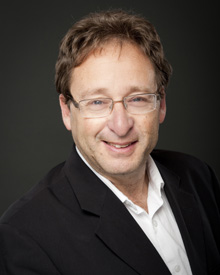
On 29 January 2018, Professor Jonathan Calof, professor of International Business and Strategy at the Telfer School of Management at the University of Ottawa and now (since 2018) also an extraordinary professor in the TRADE research focus area, visited TRADE to give a guest lecture. The topic of his lecture was: 'Global Competitive Intelligence (CI) Practices Study - Preliminary results and some interesting insights'. The lecture was recorded on video.
25 January 2018: TRADE meets to discuss SACU-EFTA Free Trade Agreement
On 25 January 2018, Professor Wilma Viviers and Dr Adelia Jansen van Rensburg from the TRADE research entity at North-West University had the privilege of meeting a small delegation from the Embassies of Switzerland and Norway in South Africa, to discuss issues surrounding the SACU-EFTA Free Trade Agreement.
The Swiss delegation was led by HE Ambassador Helene Budliger Artieda. She was accompanied by Mr Balz Abplanhalp, Deputy Head of Mission of the Embassy of Switzerland, Mr Azwimpheleli Langalanga, Economic Counsellor of the Embassy of Switzerland in South Africa, and Mr Alf Yngve Friisø, Counsellor of the Norwegian Embassy in South Africa.
The Free Trade Agreement between the EFTA states (Iceland, Liechtenstein, Norway and Switzerland) and the Southern African Customs Union (SACU) (Botswana, Lesotho, Namibia, Swaziland and South Africa) was signed in Höfn, Iceland, on 26 June 2006. The Agreement covers trade in goods and lays the foundation for further engagement between the parties regarding intellectual property, investment, trade in services and public procurement. The Agreement is currently under review and the parties will meet from 30 January until 2 February 2018 to take the discussions forward.
Past events at TRADE
2017, 2016, 2015, 2014, 2013 and 2012
3-5 December 2018: PhD student attends African Economic Conference
NWU PhD student Emmanuel Orkoh attended the African Economic Conference in Kigali, Rwanda from 3-5 December 2018. On the second day of the conference he presented a paper titled 'Gender Welfare Effects Of Regional Trade Integration On Households In Ghana'.
Photo: Mr Emmanuel Orkoh.
23 November 2018: African diplomacy in uncertain times
On 23 November, Prof Wilma Viviers and Mr Gabriel Mhonyera, attended a conference in Rosebank which explored the current dynamis facing the global world trade system. In particular, discussions focused upon how African countries are responding to the new international trade environment. The role and place of the World Trade Organization (WTO) as well as the African Continental Free Trade Agreement (AfCFTA) also featured prominently in discussions. Individuals from within the WTO secretariat emphasised the need for the WTO to transform its trading rules in the face of rising threats from protectionism and bilateralism.
Photo: Mr Gabriel Mhonyera.
19 October 2018: PhD for David Dyason
On 19 October, David Dyason received his PhD in Economics at a formal NWU graduation ceremony. His thesis was concerned with quantifying the economic impact of universities in South Africa and was titled, 'Assessing the economic impact of a South African university campus'.
3-4 October 2018: Trade opportunities and digital technologies in Africa under the spotlight at the 2018 WTO Public Forum
Ms Lorainne Ferreira and Prof Ermie Steenkamp recently attended the 2018 WTO Public Forum in Geneva (whose theme this year was ‘Trade 2030’) and presented a paper at the WTO Chairs Programme session which was held on 4 October 2018.
In their paper, titled ‘Promoting sustainable and inclusive trade in a digital era by exploring untapped intra-regional trade opportunities in Africa’, Lorainne and Ermie looked at some of Africa’s major trade, development and digital technology challenges and how digitalisation, in particular, can be effectively leveraged to improve the continent’s economic prospects. They explained that Africa is the continent with the lowest intra-regional trade in the world, with generally low Internet penetration rates being a contributing factor. African countries face many obstacles in their quest to improve their trade competitiveness and performance – a phenomenon that is extensively covered in the literature. Whereas most studies have tended to focus on the negative factors that drag down Africa’s potential, Lorainne and Ermie’s paper adopted a more positive and practical angle, focusing instead on the many trade opportunities on the continent that have not yet been tapped but which could be a game changer to many countries’ regional trade performance. They explained how they had identified a range of new trade opportunities by matching consistent import demand with export supply on a detailed product level.
About 70% of the identified opportunities on the continent had not been tapped at all. In other words, no trade is currently taking place in terms of those particular product-market combinations. While typical problems such as strong competition, and high tariff and non-tariff barriers should not be ruled out as possible barriers to trade, the possibility remains that many opportunities have simply been overlooked. The paper recommends that digital technology be used more aggressively to seize the trade opportunities identified. For example, uniform information systems could be implemented across the continent to enhance border and customs efficiency and reduce delays and trade costs. Further measures could be reporting information on non-tariff measures via cell phone and hosting information about trade opportunities on digital information platforms which trade promotion organisations could then share in different countries.
26-27 September 2018: University of Namibia standard of living conference
On 26 and 27 September, Prof Derick Blaauw and TRADE Master's student Anton van Wyk, participated in the Equality and equity towards attaining a decent standard of living conference hosted by the University of Namibia in Windhoek. Anton presented a paper titled, 'The subjective wellbeing of the informally employed in Pretoria and Windhoek'.
11-12 September 2018: International trade developments & TRADE-DSM® User Group Conference
On Tuesday 11 September, individuals from a wide range of trade related interest groups in South Africa gathered together to attend a seminar focusing on the unfolding events in the international trade arena. This seminar was combined with 4th TRADE-DSM® User Group Conference, which took place on Wednesday 12 September. The focus of the seminar/conference was to provide attendees with insights into the latest developments in international trade, including progress with Africa's Continental Free Trade Area (CFTA), bring together users of the TRADE-DSM® to demonstrate its new functionality, and to share the latest TRADE/TRADE Research Advisory (Pty) Ltd research.
Dr Mustafa Sadni Jallab (UNIDEP) spoke on 'The effect of the AfCFTA on trade flows in Africa: Some empirical evidence', and Prof Reid Whitlock spoke on 'Rwanda's road to prosperity - the role of agricultural exports'. A press release including a lot more information is available.
2018: Durham University - Unacceptable forms of work
Prof Derick Blaauw is part of a research network led by Professor Deirdre McCaan from Durham University. The UK Economic and Social Research Council (ESRC)/Global Challenges Research Fund (GCRF) Strategic Network on Legal Regulation of Unacceptable Forms of Work was formed in 2017 to support a global dialogue on UFW. The Newtork brings together an interdisciplinary team from 50 research and policy institutions in more than 20 countries in all regions. Prof Derick Blaauw is one of three lead researchers on the Strategic Network Team with special focus on Casual Work.
Find out more about this project by watching this video, 'Unacceptable forms of work: A Short story'.
Prof Blaauw (1:44) was also interviewed and features in a video that provides some more detailed information, 'What are unacceptable forms of work?'
7-8 June 2018: TRADE at the 2018 Agbiz Congress
Prof Wilma Viviers and Mr Martin Cameron were keynote speakers at the Agricultural Business Chamber (Agbiz) Congress which took place from 7-8 June 2018 in Port Elizabeth. Their topic was 'Developing strategies for export promotion using a Decision Support Model (DSM): Focus on the agricultural sector'. TRADE's agricultrual economics - Dr David Spies, Dr Ernst Idsardi, Dr Johnny van Merwe and Dr David Dyason - also attended the Congress. The annual Agbiz Congress is one of the leading events on the calendar of the South African food, fibre and beverage sectors, providing an excellent opportunity for agribusiness leaders and policymakers to network and discuss the future of the broader South African agro-food industry.
The topic of this year's congress was 'Uncertainty Creates Opportunity'. A number of top international and local experts gave presentations on important issues such as the current global agro-food environment, the global and local political economy, and environmental challenges that the various sectors face. In particular, speakers focused on the key issues of land and water reform, which are currently confronting South Africa, as well as the country's agriculture system, and the impact of technology on the competitiveness of the industry as a whole.
7-8 June 2018: Writing school
From 7-8 June 2018, TRADE Master's and PhD students, along with some staff and researchers, took part in a writing school conducted by Prof Tobie van Wyk, Director of the NWU's Centre for Academic and Professional Language Practice. The focus of the writing school was on learning how to write academic articles in a way that will improve publication success rate. A second 'follow up' session took place on 26 and 27 July 2018.
28 May - 2 June 2018: Prof Derick Blaauw's day labour research revisits Mpumalanga

From 28 May to 2 June 2018, Prof Derick Blaauw, Prof Anmar Pretorius and Prof Rinie Schenck (from the University of the Western Cape) were in Mpumalanga where they had the opportunity to expand their ongoing research regarding day labourers into that province. Prof Marianne Matthee also assisted them as a research partner whilst a team of fieldworkers were recruited from the University of South Africa’s Social Work Department.
Fieldworker training took place early during the week, with all fieldworks having been carefully selected to accommodate all the languages expected to be encountered on the streets of Mbombela, Witrivier and Emalahleni. The training was followed by two days of early mornings (6 a.m. starts) and long hours on the streets interviewing day labourers who try to make a living from informal employment. Hiring sites that were identified in an earlier reconnaissance were visited and willing day labourers were interviewed. The fieldwork went well and more than 100 interviews were conducted. Afterwards, there was a debriefing with some time spent reflecting on the shared experiences.
The data will now be cleaned and prepared for capturing. A preliminary perusal of the questionnaires has already revealed some important differences between the day labour market in 2018 compared with previous research conducted in 2008. The objective now is to publish at least two to three joint research articles in peer-reviewed journals and to prepare a number of conference papers from the data.
29 May 2018: Book launch - Good Capitalism, Bad Capitalism: The Role of Business in South Africa
On Tuesday 29 May 2018, a new book from Prof Raymond Parsons and Ali Parry, Good Capitalism, Bad Capitalism: The Role of Business in South Africa, was launched in Johannesburg. The book reflects on the role of business in the years before and after the transition to democracy in South Africa, what has contributed to the waning influence of business (and particularly organised business) in policy-making circles in recent years and what is now needed to put the country onto a more certain socio-economic path. While the advent of a new administration under President Ramaphosa has kindled a new sense of hope in many quarters, the book nevertheless asks some tough questions about the nature of capitalism today and whether it can bring about the much hoped-for change in the country or whether it will merely entrench the already deep divisions in society. Meticulously researched, Good Capitalsm, Bad Capitalism offers several valuable lessons - drawn from South Africa's recent and more distant history - which key stakeholders in government, business and labour should ignore at their peril. (Photo: Trevor Manuel, Ali Parry and Prof Raymond Parsons)
Why business must widen its horizon on hot button land issue (extract from Good Capitalism, Bad Capitalism)
Book launch media release
Good Capitalism, Bad Capitalism is available for purchase from Exclusive Books, Loot (online order) and Van Schaik Bookstore (Potchefstroom).
10-11 May 2018: Ruiterbosch conference
The 20th annual Ruiterbosch Conference took place on 10 and 11 May 2018 at the Eight Bells Mountain Inn in Ruiterbosch, Western Cape. The conference was organised by Prof Peet Strydom with the aim of bringing together South African academics, practitioners and policymakers for an off-the-record and no-holds-barred discussion on the most serious issues facing the South African economy. Prof Wilma Viviers, Prof Waldo Krugell, Dr Marie-Luce Kuhn, Mr Francous Fouche (Trade Advisory Pty Ltd) and Mr Martin Cameron (Trade Advisory Pty Ltd and PhD student) all attended the conference to participate in the discussions.
Numerous topics were presented and discussed at the conference. Prof Peet Strydom presented and led discussions on the state of the International and South African economy, robots and labour market effects as well as DSGE modelling and the microfoundations myth. Mr Martin Cameron also presented a draft paper on Independent Power Producers (IPP) and future developments.
9-11 May 2018: TIPS Training workshop
Mr Gabriel Mhonyera, a PhD student at the TRADE research focus area, attended the Trade & Industrial Policy Strategy (TIPS) training workshop in Pretoria from 9-11 May 2018. The focus of workshop was to provide participants with insights into the world of trade negotiations, with the AGOA negotiations between South Africa and the United States serving as an example. Attention was also given to the uncertainty surrounding the renewal of AGOA after its expiration in 2025 and the need for SACU to be proactive in negotiating a new reciprocal trade agreement with the US, rather than adopting a 'wait and see' approach. The workshop was facilitated by Dr Faizel Ismail, one of the individuals involved in the 2015 AGOA negotiations.
5 May 2018: TRADE colloquium #2
The second TRADE colloquium of 2018 took place on Thursday 5 May at 09:00 in E3-138. New Master's and PhD students were required to attend this colloquium to present their research problems for feedback.
15-17 April 2018: Scottish Economic Society Annual Conference
Prof Derick Blaauw and Prof Anmar Pretorius attended the 2018 Annual Scottish Economic Society Conference in Perth, Scotland, from 15-17 April 2018. Between them, they delivered a total of four papers:
The (subjective) well-being of day labourers in South Africa: The role of income and geographical location.
Trade, Manufacturing and Employment: The First Two Decades of South African Democracy
The influence of enforcement and informal institutions on the effectiveness of formal institutions: Evidence from road safety legislation.
An analysis of the co-movement between global mining indices.
15 March 2018: TRADE colloquium #1
The first TRADE colloquium of 2018 took place on Thursday 15 March at 10:00 in E3-138. New Master's and PhD students were required to attend this colloquium to present their research problems for feedback.
13-14 March 2018: Southern African DSM users group gathers for 3rd annual conference
On 13 and 14 March 2018, the TRADE research entity together with TRADE Advisory held their 3rd annual TRADE-DSM® User Group Conference. Delegates from institutions across the SACU region attended, including:
• BITC (Botswana Investment and Trade Centre)
• DAFF (Department of Agriculture, Forestry and Fisheries)
• North West Provincial Government Economy and Enterprise Development
• NWDC (North West Development Corporation)
• LEDET (Limpopo Department of Economic Development, Environment and Tourism)
• LIEDA (Limpopo Economic Development Agency)
• MEGA (Mpumalanga Economic Growth Agency)
• Eastern Cape DEDEAT (Department of Economic Development, Environmental Affairs and Tourism)
• Mpumalanga DEDT (Department of Economic Development and Tourism)
• Limpopo Provincial Treasury
• SACU (Southern African Customs Union) Secretariat
• NWU School of Business
Many interesting topics were discussed during the two-day conference, including what story the updated international trade data is conveying – particularly in the light of changing global trade patterns and the effect of the international trade data update on realistic export opportunities as defined by the TRADE-DSM®. The main features of the newly updated and enhanced TRADE-DSM® and its growing eco system were presented to conference delegates, along with the TRADE-DSM Navigator’s® new approach which includes the potential and specific requirements of the Halaal market.
In addition, certain sessions were devoted to the topic of Economic Complexity (EC), specifically in relation to why certain countries are poor and others are rich, and which new industries are likely to emerge as drivers of growth in a country. EC’s ability to predict future economic growth trends more accurately than conventional governance measures was a source of particular interest to the delegates. The ‘Scrabble theory’ of economic development was also given attention and several policy implications were debated with reference to international research findings in the EC field.
Delegates also had the opportunity of sharing their statistical data requirements (and frustrations) with the rest of the group – which will assist the ongoing TRADE-DSM® development work ‒ and of debating the role of a research department in the trade and investment world.
29 January 2018: Guest lecture by Prof Jonathan Calof

On 29 January 2018, Professor Jonathan Calof, professor of International Business and Strategy at the Telfer School of Management at the University of Ottawa and now (since 2018) also an extraordinary professor in the TRADE research focus area, visited TRADE to give a guest lecture. The topic of his lecture was: 'Global Competitive Intelligence (CI) Practices Study - Preliminary results and some interesting insights'. The lecture was recorded on video.
25 January 2018: TRADE meets to discuss SACU-EFTA Free Trade Agreement
On 25 January 2018, Professor Wilma Viviers and Dr Adelia Jansen van Rensburg from the TRADE research entity at North-West University had the privilege of meeting a small delegation from the Embassies of Switzerland and Norway in South Africa, to discuss issues surrounding the SACU-EFTA Free Trade Agreement.
The Swiss delegation was led by HE Ambassador Helene Budliger Artieda. She was accompanied by Mr Balz Abplanhalp, Deputy Head of Mission of the Embassy of Switzerland, Mr Azwimpheleli Langalanga, Economic Counsellor of the Embassy of Switzerland in South Africa, and Mr Alf Yngve Friisø, Counsellor of the Norwegian Embassy in South Africa.
The Free Trade Agreement between the EFTA states (Iceland, Liechtenstein, Norway and Switzerland) and the Southern African Customs Union (SACU) (Botswana, Lesotho, Namibia, Swaziland and South Africa) was signed in Höfn, Iceland, on 26 June 2006. The Agreement covers trade in goods and lays the foundation for further engagement between the parties regarding intellectual property, investment, trade in services and public procurement. The Agreement is currently under review and the parties will meet from 30 January until 2 February 2018 to take the discussions forward.
